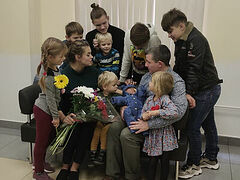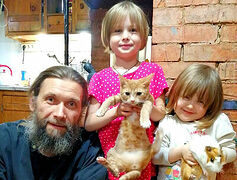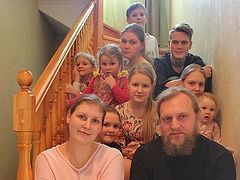Roman Nikolayevich Getmanov, OB/GYN specialist at the perinatal center of Mukhin City Clinical Hospital, has been delivering babies for the last thirty years. Besides this, he is a father to eleven children and a grandfather to nineteen grandchildren. Should pregnant women keep the fasts? What causes postpartum depression? During his interview, Roman Nikolayevich will answer these and many other questions. In Part 2, he talks about his own family.
His work
 Roman Nikolayevich Getmanov —Roman Nikolayevich, what’s your opinion about the concept of family planning?
Roman Nikolayevich Getmanov —Roman Nikolayevich, what’s your opinion about the concept of family planning?
—About twenty years ago, the Catholics in Poland organized a conference called “Christians for Life.” Doctors of various nationalities—Polish, French, German, American—spoke there. The terminology they used was quite tempting on its own: “family planning,” “planned pregnancy,” “unplanned pregnancy…” These terms were invented by a feminist who began under Hitler to immigrate to the USA, later to spearhead all feminist campaigns that existed at the time.1 Her ideology offered the following postulate: “The best help we can provide to a mother of many children is to kill her future child.” All the remaining feminist terminology that migrated from one publication to another is based on this ideology.
If a family has children—praise God, it means they were necessary
I worked in the OB/GYN field for over thirty years and I know a lot of large families with children, so I can attest to the fact that every pregnancy happens for a reason. The recent statistics from, say, Germany show that twenty percent of marriages remain childless. Half of them have no children for an undetermined cause. It has nothing to do with the fallopian tubes or hormones—they just can’t pinpoint the reason. Not every fusion of two cells in reproduction will result in the birth of a child. The research has shown that a delayed menstrual period for a day or two often indicates an interrupted pregnancy. That’s why, if God bestows the gift of having children to a family, it means this family needed it. I have been a member of the same parish for the last forty years; some of my friends are parents of only one or two children while some others have ten to twelve kids. None of us “planned” our families the way we hear today about family planning. If the children come to this life, then praise God, it means they were necessary. I look at my grown children—and I already have nineteen grandchildren—and I understand that had I not had any one of them, my family would have always remained imperfect and incomplete.
—How do multiple pregnancies affect a woman’s body?
—My wife, who is sixty years old and gave birth to ten children, has kept a healthy weight and remained in great shape throughout her life, besides remaining in good health. Thanks be to God, like any other healthy person, she has nothing to complain about. There are occasions, of course, when women aren’t too healthy… But, as a rule, women in poor health can’t get pregnant and it is greatly misleading to think otherwise. In the event the women in poor health did get pregnant, it has to be treated as an act of God’s providence in our life. It could be that a family had to undergo trials and challenges. It often happens that if a baby is born with physical disabilities he becomes the best-loved child in his family. It could also benefit the family, ensuring that we don’t grow apathetic or inhumane, but are able rather to lead the lives of compassionate and caring human beings. We should care and be concerned about others as well as make sacrifices for their sake—that’s what family life is all about.
—Do you think the IVF procedure is permissible as a fertility treatment method?”
In vitro fertilization (IVF) is militant atheism
—My opinion is fully governed by the Social Doctrine of the Russian Orthodox Church. It states that the Church doesn’t give Her blessing for in vitro fertilization. It also expounds on the reasons why it is against it. As a member of the Church, I am not interested in fighting this policy, or even less so in taking any responsibility for it. All I can say is that I stand in full solidarity with the Church. Another thing is that the times have changed and it’s been twenty years since this policy adoption, so, as far as I know, there are plans to discuss this question at the next Council of the Russian Orthodox Church. New data is being collected, and I am a signatory party at one of those documents stating that in vitro fertilization is equal to militant atheism.
—About fifteen years ago, you said in one of your interviews that those who were conceived through IVF would be unable to conceive on their own. Has the situation changed in this regard?
—You won’t find the statistics on in vitro fertilization anywhere. I mean trusted data from respectable sources. The only way I can learn the specific information is only through my conversations with colleagues at conferences and seminars. Fundamentally, nothing has changed. According to their professional opinion, those who were conceived via IVF can only become parents using the same method. But I have to stress here that it is my personal opinion, not official information.
—Do you approve of home births?
“I do, but with some reserve. In the Netherlands, home births are allowed, but they also have an exact estimate of how long it would take to bring a home birthing woman to the nearest maternity ward. They’ve got excellent roads, and as a rule this time amounts to mere minutes. Can you guarantee the same level of medical emergency services accessibility in our country?
—Not everywhere.
—You’ve answered your own question. Any birthing experience is a unique process and there’s nothing more natural than that. Believe me, I observe it in my daily work. I have a running joke, and it may sound crude to some, but my patients seem quite receptive to it: Giving birth is the same as peeing. If a woman is healthy, she will deliver without my help, once or a hundred times—she simply doesn’t need you. But! There are situations when the presence of a doctor is a must. I’ll give you the following example: Natalia Nikolayevna Goncharova gave birth to four children. Natalia Nikolayevna was a shapely, healthy, and all-around well-built woman. How big were her children at birth? They weighed between 2.4 to 2.6 kilograms. At the beginning of the nineteenth century, this was considered average infant weight at birth. When I began practicing as an obstetrician over thirty years ago, all newborns over 4 kg were sent to the endocrinology specialist for evaluation. It was considered a pathology, and there were few births like that at the time. Nowadays, every other newborn weighs 4 kg.
—Is it because of developmental acceleration?
—It has nothing to do with acceleration, it is about the degeneration of the human race. Women’s hip sizes have remained the same but they deliver extremely large babies. If things progress this way even further, women will simply be unable to deliver them. There are lots of reasons for this, but one of them is food quality degradation. Everyone consumes meat but its source, cattle and poultry, is generously fed antibiotics to reduce mortality from livestock diseases—and growth hormones, to increase profit. These antibiotics and other additives find their way into the human body. My friend and I recently went on a fishing trip and bought a sterlet sturgeon—we wanted to use it in our fish soup to add richness to its flavor. What do you think has happened? We ended up dumping our ukha (Russian fish soup.—Trans.), as it was not edible. Why? Sterlet, grown in a pond and fed with ready-mixed feed, tasted like soap, so we had soap suds instead of ukha. That’s what we eat and how we live these days. Can you change it? The only way out is to tend a garden of your own and eat homegrown food. But it translates into a completely different lifestyle and work effort.
—Roman Nikolayevich, in your opinion, it is necessary for pregnant women to keep fasting? Won’t it cause any harm to a future mother or her baby?
—What is fasting? It is primarily abstaining from something. You’d better eat those sausages and eggs instead of letting loose on your loved ones or scolding someone at work. If we are talking about a balanced diet, then as a rule, pregnant women, and especially those with multiple births, typically receive a blessing from their priest to relax fasting and consume milk products. No one will keep a pregnant woman without milk or cottage cheese. As for meat, we should look at the hemoglobin level. If she is expecting her tenth child, who will press her into fasting? This problem was invented by neophytes or those who are out of the loop as far as fasting goes. They theorize and rant on the topic of fasting, not knowing a thing about it. If a woman’s hemoglobin level is 90, not only can she eat meat and milk products—she simply must have them in her diet. She must eat meat!
—If a new mother develops the “baby blues,” or postpartum depression, is it possible for her to get over it quickly?
Depression is despondency and it is rooted in sin. The problem here isn’t about hormone fluctuation but more of a spiritual state
—That is a difficult question. I will explain myself. In each case, postpartum depression was caused by a certain event. We should know the specific details about every woman, her family, and the family’s situation. Let’s say, I have a patient who gets depressed after giving birth; I start talking to her and find out that she killed her previous baby—in other words, she had an abortion. It is only an example. The human conscience is a very intricate mechanism; we must understand what this particular person experienced in her life. That’s why there can be no universal recipe for everyone. Postpartum depression never happens on its own, it is primarily set off by internal problems or unacknowledged sins. Depression means despondency, and it is rooted in sin. The problem here isn’t about hormone fluctuation but more about a spiritual state.
Back in the day, at the beginning of my work shift, I would usually start by looking at the anamnesis: how many pregnancies, what kind of birthing experience a woman has had, and whether there were any abortions. My experience taught me that if a woman was giving birth following an abortion she would likely experience problems. That’s why I paid great attention to those details. Abortion is murder; it’s horrible. It transforms the woman, who can’t perceive things adequately like any normal human being. The way abortion affects a woman’s mental health is simply astounding. That’s why labor can sometimes become abnormal for no obvious reason. I always have to pay particular attention to this issue.
—Have you ever had to talk women out of having an abortion?
—Back in the 1990s, there was a period in my life when I was out of work and Fr. Dimitry Smirnov helped our family survive. He had arranged that I would come to maternity center No. 17 to speak to those who signed up for abortions. They weren’t allowed to sign the papers unless they spoke to me first. I had nothing to do with the abortions performed there but I had to speak to a certain number of those women every day. It was hard but very informative. One day, there was a mother and her eighteen-year-old daughter who came there to sign up for an abortion. When you are attempting to bring someone back to their senses, you have to grab their attention and find a way to affect them personally. I was trying to get an idea of how to get the daughter interested in our conversation but she was totally out of it, staring off apathetically. Her mom kept listening to me for a while and then she exclaimed, “Doctor, that’s nothing but smooth talk! I have been through so many abortions and I’m doing just fine. Why, is she better than me?” That’s how abortions affected her mental state—she was no longer human. But I actually knew what to do, as I had experience by then. “What are you talking about,” I retorted. “Do you want her to be beaten by her husband like you, every day?” That’s when mom got upset. Abortion and family are two things that don’t go well together.
If you love each other, how can you kill your baby?
Or sometimes I would observe a different situation: a young couple, both students, comes to see me in the middle of their mid-term exams. They tell me: “Doctor, we have to wait until we graduate to have kids.” It provides fertile ground for our conversation. I don’t have to persuade them as these people love one another; they just haven’t fully recognized what they came here for. That’s when I am always able to help. If you love one another, how can you kill your baby? Don’t you understand that you sabotage your love! You will get your degrees but you won’t stay together. Of course, a baby will require a lot of your attention and you will have to sacrifice certain things. But all of my children have graduated and had their own children—and they did well. Your parents will help you, or your friends, and you will be able to graduate as planned. But you can’t do it at the expense of your baby’s life! More often than not they get it, because they love each other. I think the situation has changed for the better, and according to my observations, abortions are not as common as before.




